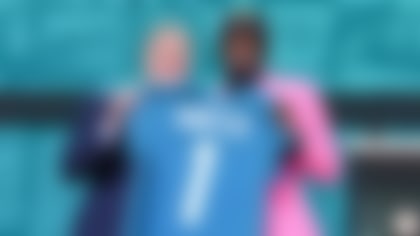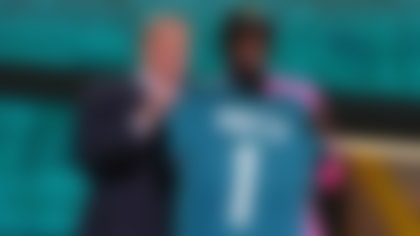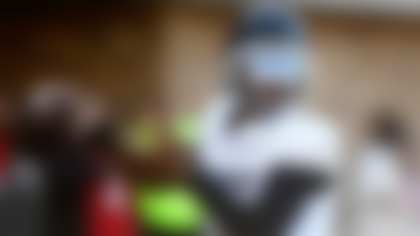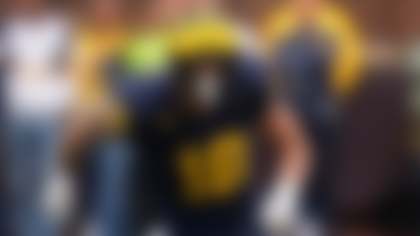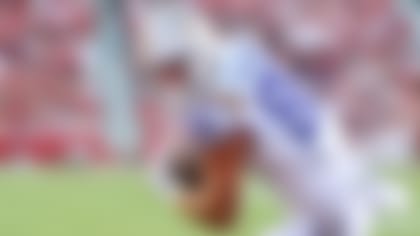Walking off the field in team-issued sweats on Jan. 13, his Houston Texans having just been eliminated from the AFC playoffs, injured linebacker Brian Cushing was hit with mixed emotions he hardly expected.
As you'd guess, he was disappointed for his guys, who were wrapping up the most successful season in club history three wins short of the ultimate goal. But there was also, in a way, some weight lifted off the 255-pound former All-Pro's shoulders.
"I don't want to say I'm happy we lost," Cushing said on Wednesday, wrapping up another day of work in his comeback from October surgery on his anterior cruciate ligament. "But it was a feeling where, 'OK, we're at the end now, and we're all starting at the same point again.' It was the offseason. And I knew, the next time the team takes the field, I'll be there."
The price Cushing paid for tearing his ACL on a Monday night in October in his native New Jersey was tangible: 11 regular-season games and two playoff games at age 25, when he's just entering the prime of his career.
And that's not even the worst part. To Cushing, what really stings is that what happened on that low block from New York Jets guard Matt Slauson was so completely avoidable.
This week in Indianapolis, the competition committee is staging its initial meetings for the 2013 season, and the idea of eliminating all low blocks is on the table. The group brought in players, including Cushing's teammate Antonio Smith, to discuss the issue, and will draft rules proposals next month in Florida, with the league voting on them at the NFL Annual Meeting in Arizona at the end of March.
Very clearly, Cushing has a horse in this race.
"I'm happy they're taking the initiative to look at this," Cushing said. "To me, it's an acknowledgement that defensive players have to be protected, too. I wasn't the first guy to go down like this; there have been similar injuries. What happened, that's a play that can be eliminated. You look at the play, it doesn't need to be done. So for them to go back and really acknowledge that guys need to be protected, that's moving in the right direction."
Harrison: NFL combine primer
Wondering who to watch at the NFL Scouting Combine? Elliot Harrison breaks it down by the draft needs of all 32 teams. **More ...**
For Cushing, this type of injury actually was a first. He identifies a torn labrum that cost him five games his freshman year at USC -- and which necessitated surgery the following offseason -- as his most serious prior ding, and his football career goes all the way back to when he was in the third grade.
He hasn't shied away from watching the play -- which happened on a second-and-7 in the second quarter of Houston's Week 5 win over the Jets -- to see just how it happened all over again. He explained that "for two days, I couldn't believe it, so I watched it a couple times, and again. Soon enough, I won't watch it again."
He never wavered on his takeaway from the tape.
"I can understand if you're 180 pounds and trying to block a 300-pound guy, and you know you have no chance," Cushing said. "But I'm not looking, we're behind the ball, and it's low. And he specifically, with a purpose, went for the knee. There was nothing clean about it. There's no debate on whether it was clean. The league fined him $10,000, so they had a problem with it; they felt there needed to be a fine, which means they agreed it wasn't a clean play."
Asked if he had heard from Slauson, Cushing quickly responded, "No. But I didn't expect that. It's how he wanted to go about that. I don't have a relationship with him, nor am I looking for one. It doesn't bother me. It wasn't gonna help me come back, and I don't really care what he thinks."
Now, just because Cushing can recount the play, split-second for split-second, doesn't mean he's consumed by it. In fact, the way he sees it, some good has come of all this.
For one, he was forced, for the first time, to consider what life after football will be like.
Offseason Forecast: Texans
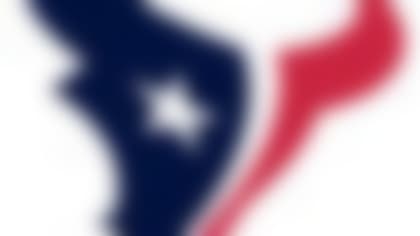
With the offseason under way, Around The League examines what's next for all 32 teams. Marc Sessler covers the Texans. **More ...**
To that end, he's planning on returning to USC next spring to finish his degree, and he wants to use that as a springboard to business school, where he can pursue his MBA. In his time on the sidelines, he learned that he doesn't want to coach, so when he's done with the NFL, that'll probably be it for football.
The other thing he learned while being shelved for a longer stretch than he ever has before is just how much he loves playing.
He's talked with Minnesota Vikings tailback Adrian Peterson, who emphasized focus, and Vikings linebacker Chad Greenway, who's bounced back from multiple torn ACLs. He's also been texting with Wes Welker through the process, with the Patriots receiver telling him that the workload determines the timetable.
"I've looked at guys like Adrian Peterson and (Kansas City Chiefs running back) Jamaal Charles, and they came back just as good, if not better," Cushing said. "Adrian had arguably the best season ever by a running back. I know he's a hard worker, and hard work, that's something I can do. I'm very focused, motivated. I feel like I had it taken away from me, that camaraderie; I missed it a ton."
Next week, he'll start jogging on an Alter-G -- an anti-gravity treadmill -- with the idea that he'll "reprogram" his ability to run. Cushing's work is being done mainly at the team facility in Houston, with periodic check-ins with Dr. James Andrews in Pensacola, Fla.
He said he's "keeping goals short-term, not looking ahead and trying to avoid setbacks. Getting to 100 percent, that's the biggest thing, for Week 1. I want to be the same player, if not better."
As for the possibility that he could effect larger change, Cushing echoed what many defensive players have said for years: that they aren't protected in the same way as their offensive counterparts. His beliefs -- that quarterbacks in particular "make more money, and have more invested in them, so there's more depending on them" -- are not novel.
Still, even if his injury results in something being done to balance the scales just a little, he'll feel good about it. No, it won't make up for the time lost after what he considered to be such an avoidable event. But at least then, maybe he'll feel that time was slightly less wasted.
For its part, the competition committee has taken this seriously, at least on the surface. Though chairman Rich McKay didn't immediately respond to a Wednesday email on this topic, NFL executive vice president Ray Anderson told me -- all the way back in the fall -- that there was good reason to eliminate all low blocks.
Cushing doesn't think there should be much debate. The time for action is now.
"I'm not the first; a lot of people have spoken up," he said. "If it saves other guys from things like this and prevents future injury because we spoke up about it, that's great. If that means football is safer going forward, and more people feel comfortable playing, even better."
Of course, the best thing would've been for Cushing to be on the field, for him not to have to sort through those strange emotions on that cold January night in Foxborough, Mass.
But maybe, in lieu of that, the competition committee will deliver a nice consolation prize to him next month.
Follow Albert Breer on Twitter @AlbertBreer.


